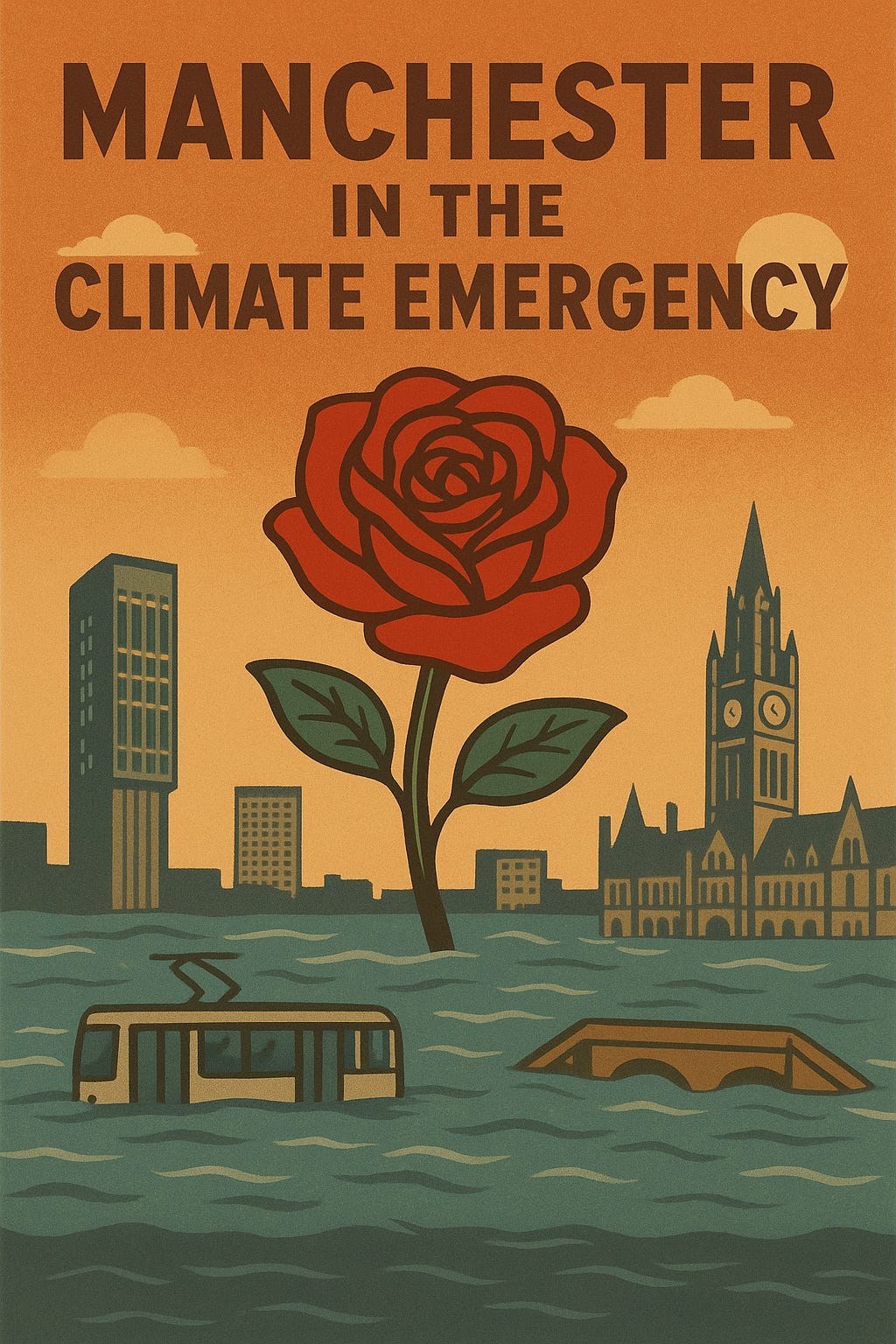Manchester in the Climate Emergency: A City on the Brink
Dr North considers the consequences of the climate emergency on Manchester, and what we can do about it.
Manchester has always had the unique ability to remake itself. From the mass pollution of the Industrial Revolution to today’s glass towers, we pride ourselves on resilience, innovation, and progress. But there is a major crisis looming—the climate emergency.
The reality is simple. If we continue our current path, Manchester’s future will be hotter, wetter, and more unequal. Without urgent action, the city risks becoming a case study in how not to prepare. Experts are already warning that Manchester could become “unliveable” if the climate disaster continues on its current trajectory.
Heatwaves in the North
In July 2022, the UK recorded its first 40°C day. Manchester is not immune to rising temperatures. Climate models show that extreme weather events will become normal within decades. For a city built on brick terraces, concrete estates, and glass office blocks, rising heat will bring dangerous consequences:
- Public health crises as poorly insulated homes trap heat.
- Infrastructure stress with roads, rail, and tram lines buckling.
- Reservoirs (which are poorly maintained by private water companies) will increasingly empty and create dangerously low levels of water supply.
- Energy spikes as demand for air conditioning and cooling outpaces supply.
Heat will not affect everyone equally. Affluent areas can afford air conditioning and green space. Inner-city communities, already battling poor housing and limited access to parks, will be left to suffer in extreme heat.
Flooded Streets, Broken Systems
Manchester is a rainy city—but climate change means heavier downpours, more flash flooding, and rising rivers. The Irwell and Medlock already flood in extreme weather. Our beautiful canals are bursting because of the high levels of rainfall. Without adaptation, Piccadilly, Salford Quays, and parts of South Manchester could face regular flooding.
Flooding means:
- Damage to homes and businesses, raising insurance costs or making cover impossible.
- Migration from areas of high flood risk to lower risk areas.
- Public transport disruption, from flooded stations to blocked tramlines.
- Knock-on economic impacts, as investment shifts away from “high-risk” regions.
A Divided City
Climate breakdown does not just threaten the weather—it threatens social fabric. If food and energy prices rise with every flood and drought, the poorest in Manchester will pay first and hardest. A city that prides itself on its working-class solidarity could fracture under the strain.
This is not hypothetical. The cost-of-living crisis shows how quickly costs spiral and communities suffer. This suffering then translates into social unrest and division. Climate change will massively amplify these tensions with infrastructure breakdown, supply pressures, and increasing migration from high risk to low risk areas.
Why We Must Act
The good news: Manchester has choices. The city has already pledged to cut emissions by 44% from 2025-2030 and to reach net zero by 2038—12 years ahead of the UK government’s national target. But pledges must turn into progress.
What we must do:
- Create green housing: retrofit insulation, expand renewable heating, and make climate resilient homes a right.
- Expand public transport: fewer cars on the road means cleaner air and lower emissions.
- Protect green spaces: from Heaton Park to local playing fields, trees and grasslands cool cities and absorb water.
- Invest in resilience: new drainage, flood defences, and climate-proofed infrastructure.
- Hold businesses accountable: demand that Manchester’s property developers and corporations cut emissions, not just residents.
The Manchester Choice
We can choose to stumble into crisis—sweltering summers, flooded streets, rising inequality—or we can act like the city we’ve always claimed to be: bold, creative, and determined.
The climate emergency is not a distant storm. It’s here, reshaping Manchester already. The only question left is whether we shape the future, or the future shapes us.


